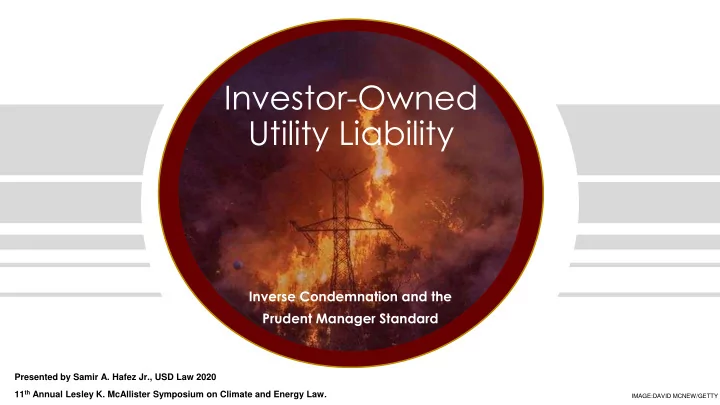

Investor-Owned Utility Liability Inverse Condemnation and the Prudent Manager Standard Presented by Samir A. Hafez Jr., USD Law 2020 11 th Annual Lesley K. McAllister Symposium on Climate and Energy Law. IMAGE:DAVID MCNEW/GETTY
Inverse Condemnation Taking for a Public Use “Private property may be taken or damaged for a Causal relationship between the governmental activity and property loss. public use only when just compensation. . . has first been paid to, or into the court for, the owner.” Strictly liable irrespective of fault, where public improvement causes damage, even if only one of several concurrent causes. California Constitution Article I Section 19
Barham v. Southern Cal. Edison Co., 74 Cal. App. 4th 744 (1999) Public Entity 1993 Mill Creek Fire sparked by faulty transmission lines located “The nature of the California regulatory scheme demonstrates above SCE property. that the State generally expects a public utility to conduct its affairs more like a governmental entity than like a private corporation.” SCE Argued: Inverse Condemnation should not Public Use apply to privately-owned public “The transmission of electric power through the facilities that utilities. caused damage to the Barham’s property was for the benefit of the public.” Since the lines were located above SCE property, the activity constituted a private use. 3
Pacific Bell Telephone Co. v. Southern Cal. Edison Co., 208 Cal. App. 4th 1400 (2012) Ground fault sent electricity through No Rate Limitation Excuse several telephone cables. No evidence that CPUC would prohibit cost-recovery through rates. California Constitution allows for CPUC regulation of municipally owned utilities as well. SCE argued: Loss-spreading rationale behind inverse No Flood-Case Exemption condemnation should not apply because SCE taxing authority is limited by approval The reasonableness rule seeks to encourage beneficial by CPC. flood control projects by only allowing compensation for property found to be unfairly damaged. Flood-case exemption should apply “It is the public improvement, not nature, that creates the risk of disaster.” 4
Regulatory Structure Cal. Const. Art. XII S.3 Private corporations that “. . .own, operate, control, or manage . . . the production, generation, transmission, or furnishing of . . . power . . . directly or indirectly to or for the public . . .” as public utilities subject to legislative control. Cal. Pub. Util. Code § 454 CPUC review and approval of a public utility’s proposed customer rates. Permissible rates allow the utility to recover costs and expenses plus a reasonable return on the value of property devoted to public use. So. Cal. Gas Co. v. Pub. Util. Com., 23 Cal 3d 470 (1979) Cal. Pub. Util. Code § 451 “Any rate found to be unjust or unreasonable is unlawful.” Prudent Manager Standard Asks: Did the utility incur recoverable costs in a reasonable and prudent manner? 5
2007 Witch Fire in San Diego. SDG&E incurred $2.4 billion in related costs 6
JOINT APPLICATION TO ESTABLISH A WILDFIRE EXPENSE BALANCING ACCOUNT (WEBA) A. 09-08-020 (2009) Record all amounts paid by the Utility arising from wildfires, reduced by payments received from third parties. “The unavailability at a reasonable cost of Payments would be recoverable unless: “Results from acts or omissions intentionally engaged in directed by Utility insurance coverage for third-party claims arising management with an intent to cause harm or with from wildfires requires the adoption of a knowledge harm was substantially certain to result.” mechanism that will ensure Utilities are able to recover costs resulting from wildfires.”
DECISION DENYING APPLICATION D.12-12-029 (2012) Denied SDG&E and SoCalGas’ request to establish a Wildfire Expense Balancing Account but kept open their Wildfire Expense Memorandum Accounts. “WEMA is only a tracking mechanism “Financial incentives for prudent risk that requires management and safety regulation compliance are substantially undermined by the a subsequent reasonableness review presumption of recovery from ratepayers” that remains in place as standard practice of rate recovery regulatory design. “
Application of SDG&E for Authorization to Recover Costs Related to the 2007 Southern California Wildfires A.15-09-010 (2015) $379 million “Due to the reasonable and Reduced Total Liability ($2.4b) by: $1.1 billion liability coverage prudent steps SDG&E $824 million third-party settlement payments $42 million voluntary contribution undertook over the past Decision several years to reduce “On balance, SDG&E failed to meet its burden to show that its operation and management of its system leading up to the wildfire costs dramatically.” 2007 Wildfires, and its immediate response at the time of the fires, was reasonable and prudent” Rate recovery would be unjust, unreasonable, and unlawful
The Conflict Realized “Order Denying Rehearing of Decision D.17 -11- 033” D.18-07-025 (2018) CPUC SDGE §451.1 and Constitutional requirements. Unnecessary conflict of laws Inverse condemnation had no effect on Produced an unjust and unreasonable operations prior to the fire result Decision based on statutory obligations and Violated Constitutional takings principles. established ratemaking practices.
Senate Bill 901 (2018) Wildfire Reasonableness Standard for Wildfires after 2018 (Cal. Pub. Util. Code § 451.1) “Stress Test” for 2017 Wildfire Review (Cal. Pub. Util. Code § 451.2) Assembly Bill 1054 (2019) $21 billion Wildfire Fund $2.50/month retail electric utility bill surcharge $7.5 billion initial utility contribution $300 million aggregate annual contributions thereafter Eligibility: Valid Safety Certification and Approved Wildfire Mitigation Plans Conduct deemed reasonable, unless a party creates serious doubt of the utility’s conduct. 11
Thank you Samir A. Hafez Jr. USD Law Class of 2020 shafez@sandiego.edu
Recommend
More recommend